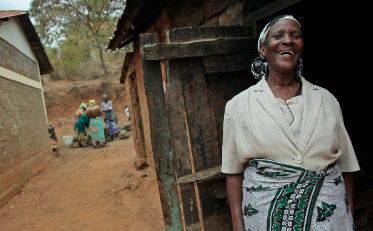Why the UN should put jobs first
25 Sep 2013
The poor need jobs now, they cannot wait
Professor Kash Rangan, Harvard Business School, Sohel Karim, Managing Director, Socient Associates, and Josefine Lindänge, COO, Hand in Hand International explain why the world needs to pay attention to jobs
Today, the UN General Assembly is gathering to discuss the High Level Panel Report on the post-2015 agenda. One of the key points of discussion will be the Panel’s Illustrative Goal No. 8 to “Create Jobs, Sustainable Livelihoods, and Equitable Growth”.
The need for jobs is overwhelming and unquestionable: the ILO predicts 600 million new jobs will be needed in the next ten years. So, it is good news that job creation is finally attracting attention but, what action do we want?

Martha Kimuyu Kinai | Machakos, Kenya
We want a road map that obliges governments, the private sector and NGOs to provide the infrastructure, innovation, finance and training needed to enable the burgeoning informal economy to flourish and to help achieve shared prosperity.
If you are poor, your overriding concern every day is where to find the money to put food on the table. What makes and keeps people poor is that they cannot they cannot find a job. Neither the corporate sector, nor government can provide the millions of jobs needed. Most of the poor find a living in the informal economy which, the ILO estimates, accounts for 70 percent of the workforce.
In this informal economy a job is often not a paycheque. The World Bank estimates that more than 3 billion people are working, and nearly half work in farming, small household enterprises, or in casual or seasonal day labour. This is not something which we should ignore or see as a problem.
It is true these micro-entrepreneurs often make a poorly paid and vulnerable living. The challenge the UN faces this week therefore is how to create and grow small businesses which will generate shared prosperity.
What governments can provide is a stable environment governed by the rule of law and universal access to education, healthcare, housing and transport.
After all, no business will thrive if the owner is unwell, lacks basic education and lives in an area where road and rail links are so bad that he cannot transport his goods to bigger markets.
Take Philomena, a shopkeeper we met in Machakos County just outside Nairobi. Her shop, the only one in a 15km radius, is doing well but cannot do more than cover her family’s basic needs until the dirt roads in the catchment area are improved. Her customers face a long, slow journey on roads which become impassable in the rainy season and Philomena herself faces an hour-long journey by donkey cart on those same roads to purchase stock from the nearby town.
Assuming the infrastructure is in place, how do we foster the expansion of micro-enterprises?
Finance seems the obvious answer. After all, one in two family entrepreneurs in developing countries say their biggest obstacle is lack of capital. As with any economic activity, microenterprises need financing. Microfinance was the response to this reality. However, the results have shown that while it has brought undoubted benefits, the availability of finance alone cannot enable the widespread stimulation of the informal economy and the shared prosperity we seek.
A holistic approach is needed in which finance is one of several pieces in a job creation model which reaches the very heart of the informal economy – the poor village or the slum life.
Our combined experience over decades of working with organisations that tackle poverty has shown us what is needed: a system that encourages people to learn the power of group support and a shared goal; that encourages the poor to save just a little each week so they can start their own business or secure a loan; that teaches the poor how to run a small business, not in a classroom with a whiteboard, but with leaders from their own community, through parables, stories and songs.
Microenterprises can provide millions with employment globally. We have seen hundreds of thousands of microbusinesses created with support from grassroots level NGOs such as Hand in Hand, BRAC or CARE. However, unless government and business work together to provide the infrastructure and markets small businesses need to succeed, these NGOs’ efforts will remain isolated pockets of good intentions.
We know the challenge we face. We have the answers. What we need now is action.
